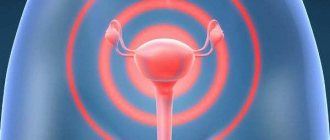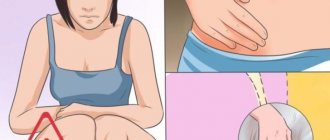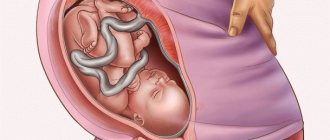A softened and slightly open cervix can easily be injured, as a result of which small amounts of bloody discharge of various colors (red, brown) may appear during the examination. It is also possible that smearing may appear within 2-3 hours after the examination.
Such discharge does not pose any danger to the further course of pregnancy; on the contrary, it can be considered a favorable sign indicating the body’s readiness for childbirth.
Having sex
information During pregnancy, provided that its physiological course is normal, you can have sex, but you should be careful about the choice of positions, especially in the later stages.
Careless sex can also cause brown discharge before childbirth, which may appear within 2 days after intercourse.
Removal of the mucus plug
Before childbirth, brown discharge may also appear as a result of the passage of a mucus plug, which covers the lumen of the cervix throughout pregnancy, thereby protecting the baby from the effects of various microorganisms.
The plug can come off at different times before the onset of labor: in some cases, contractions begin literally after a couple of hours, and sometimes labor begins only after 2 weeks.
Additionally , it should be noted that when the plug is rejected, the discharge may have a different color: light, pinkish, mucous with thin streaks of blood, but it is the brown discharge that indicates that labor will begin in the near future.
When to see a doctor
If brown discharge appears as a result of the situations described above, then it does not require an emergency visit to an obstetrician-gynecologist, however, it should be understood that “spotting” can also appear in a number of other cases that are dangerous for the child and the woman herself. For this reason, in any case, you should play it safe and consult a doctor, or at least contact him by phone and explain the current situation.
In some cases, you should contact your doctor immediately:
- The appearance of discharge accompanied by an unpleasant odor
. This may indicate an infection, which is extremely dangerous for the child, especially at the end of pregnancy: the cervix is slightly open and microorganisms can easily penetrate into the uterine cavity; - The appearance of bloody discharge that is not brown or brown in color, but has a bright red color
. Such a “daub” may indicate serious complications of pregnancy: premature detachment of a normally located or presenting placenta; - Copious bleeding
. This situation also occurs as a result of pathology of the placenta and requires emergency care, because threatens the life of the child and mother. If such discharge appears, the woman should immediately call an ambulance (under no circumstances should she go to the maternity hospital on her own); - Discharge from the genital tract of any color and in any quantity, accompanied by deterioration in health or the occurrence of cramping and aching pain in the lower abdomen or lumbar region
. These symptoms, first of all, may indicate the development of labor.
Hygiene before childbirth
Of course, any woman should carefully observe personal and sexual hygiene, but she should take this especially seriously before the upcoming birth.
Towards the end of pregnancy, the cervix opens slightly, the mucous plug comes off, and therefore the risk of infectious agents entering the uterine cavity, and therefore the baby, increases significantly.
Hygiene rules before childbirth:
- Shaving the pubis and perineum;
- Sexual hygiene at least 2 times a day and after each act of defecation;
- Sanitation of the vagina;
- Refusal of sexual activity;
- Refusal to take a lying bath and visit the pool, bathhouse, sauna
.
Shaving the pubis and perineum
In many maternity hospitals, doctors and midwives insist on this procedure and do so not without reason. Shaving should be done for a number of reasons:
- Maintaining hygiene
. After childbirth, a woman begins to have profuse bleeding, and therefore hygiene should be very strictly monitored to prevent infectious complications; - Control of the perineum during childbirth
. During the eruption of the baby's head, the midwife carefully monitors the condition of the perineum to prevent its rupture. Hair will significantly hinder this; - Suturing ruptures
. During childbirth, incisions in the perineum are often made to free the exit for the baby. During suturing of the perineum, hair can get into the wound, which interferes with the doctor and subsequently leads to infection of the wound.
Sexual hygiene
important Intimate hygiene before childbirth should be carried out especially carefully. The genitals should be washed with warm boiled water at least 2 times a day and after each act of defecation.
You can also use decoctions of medicinal disinfectant herbs (chamomile, oak bark, calendula).
Vaginal sanitation
Sanitation of the vagina should be carried out only as prescribed by a doctor. During pregnancy, you should never take medications on your own, even local ones (suppositories, ointments, creams).
Closer to the 38th week, the doctor must take a smear of vaginal flora and, based on the results, prescribe local treatment. Quite often, even with a good smear, specialists prescribe prophylactic administration of suppositories to prepare for childbirth.
Refusal of sexual activity
Many women believe that having sex before childbirth is beneficial because... accelerate the body's preparation for the birth of a child.
Of course, this is true, because due to the prostaglandins contained in sperm, the cervix begins to soften and open faster, but you should still remember that the risk of infection is very high at the moment. You should not risk your health and the health of your child.
Refusal to take a lying bath and visit the pool, bathhouse, sauna
Taking a lying bath is, in general, undesirable for any stage of pregnancy, and even more so before childbirth after the mucous plug has come out. The reason for this ban is the same high risk of infectious complications.
Source: https://baby-calendar.ru/vydeleniya/pered-rodami/korichnevye/
A little theory
Discharge usually intensifies at 38 weeks of pregnancy. However, the amount of cervical fluid generally becomes larger at the very beginning of the period. Why is this happening?
When a female and a male cell meet in the body of a representative of the fairer sex, conception occurs. During this period, the corpus luteum, located in the ovary, actively produces progesterone. Under the influence of this hormone, the tone of the uterus is normalized, the endometrium becomes thicker, and the muscle organs relax. During this period, a mucus plug begins to form. The amount of mucus increases, and some of it remains in the cervix. This formation will accumulate its volume until the last weeks of pregnancy. This plug allows you to protect the baby’s developing body from the penetration of pathogenic microorganisms. It is worth noting that not all women experience this lump. Many people have no idea that there was some kind of blockage in their body.
Pink discharge in the early stages
If pregnancy occurs at the moment when your period should have arrived, specific discharge appears. Pink discharge at the beginning of pregnancy is associated with insufficient amounts of the hormone progesterone. This is observed in approximately a ninth of all pregnant women - the frequency of occurrence of such a symptom.
Pink discharge from the uterus
A lack of the hormone progesterone triggers the mechanism of partial rejection of the upper epithelium of the uterus - the endometrium. A similar thing occurs when menstruation occurs. The difference is that in the second case, endometrial detachment occurs completely, and during pregnancy this process is partial. If there is no pain in the lower abdomen and the tone of the uterus is preserved, then there is no need to worry about such discharge. However, it is still worth contacting a specialist.
Some doctors classify pale discharge as a sign of a successful pregnancy. As a rule, they appear against the background of an ongoing delay in the menstrual cycle. Such discharge no longer occurs at 9 weeks of pregnancy. To confirm conception, it is necessary to conduct a test, a positive result of which is a reason to visit a gynecologist.
What is the norm?
Is discharge always normal at 38 weeks of pregnancy? Certainly not. Every expectant mother needs to know what is normal and when it comes to a pathological process. Be sure to visit a doctor and find out in more detail about your discharge. What should they be like normally?
During the entire period, a woman may notice thin or creamy discharge. They are light in color and resemble milk in appearance. Also, this mucus has virtually no odor. Sometimes a representative of the fairer sex can say that they smell of slightly sour milk. The consistency of such mucus is always homogeneous. It does not contain lumps, blood or other impurities. This situation is normal. Any deviation from the described picture may indicate pathology. However, if you are already 37-38 weeks pregnant, there may be other discharge. Let's consider the possible reasons for the appearance of this or that mucus discharged from the vagina.
Fetal development at 38 weeks of gestation
- By this time, boys' testicles should have descended into the scrotum. If this does not happen at the time of birth, the baby may experience certain difficulties in the future.
- Your baby has become incredibly beautiful at 38 weeks of pregnancy! His skin has smoothed out and acquired a natural pinkish tint, his face has clearly defined features, the vernix and fluff have almost disappeared, and hair can grow on the baby’s head.
- Most babies are born with light eyes, but many will have darker irises. If a child was born dark-eyed, then, most likely, the color of his eyes will no longer become lighter.
Fungal infection: thrush
White discharge at 38 weeks may indicate that a woman’s vagina is affected by a fungal infection. About half of expectant mothers experience thrush. At the same time, many representatives of the fairer sex have been trying unsuccessfully to cure the disease for a long time. During thrush, vaginal discharge becomes intensely white. Outwardly, they resemble curd masses. These substances strongly irritate the mucous membranes of the genital organs. That is why the symptoms include itching, redness, and discomfort. What recommendations does the doctor give in this case?
If such discharge is discovered at the end of pregnancy, it is necessary to carry out treatment as soon as possible. Often, drugs such as Pimafucin, Terzhinan, Diflucan, and so on are prescribed for this. Doctors also recommend using soda and saline solutions for washing. Douching, which is carried out by many expectant mothers, is strictly prohibited during this period. Otherwise, fungus and pathogenic microflora can enter the vagina and affect the baby.
Inflammatory process: infection
If you are 38 weeks, yellow discharge may be a sign of a serious pathology. Such purulent discharge often takes on a thick consistency. In addition, expectant mothers notice an unpleasant odor and itching. Sometimes there is pain in the pelvic area. The inflammatory process may be a consequence of a recently acquired infection. It is often transmitted during subsequent sexual contact. This is why it is so important to use condoms during pregnancy. When the pathology was acquired even before conception, we are talking about a chronic form. This is more dangerous for the woman and her baby. Chronic inflammatory process is almost impossible to cure.
What do doctors recommend doing in this case? Gynecologists prescribe treatment for the woman. In this case, antibacterial drugs are most often used: Metronidazole, Amoxicillin, Naxogin and many others. It is worth noting that in more severe cases, a woman is prescribed a caesarean section. This is necessary so that the baby can avoid infection during the genital tract. That is why it is so important to undergo examinations and cure all infections before conception.
Changes in a woman’s body at thirty-eight weeks
Perhaps you are afraid that you might miss real contractions, mistaking them for training? Don't worry, even if you're not 38 weeks into your second pregnancy, you're unlikely to miss the start of labor.
Real contractions are difficult not to notice, because they are very noticeable and painful, periodically repeated, while increasing their intensity and frequency.
Do not forget that sex at 38 weeks of pregnancy is strictly contraindicated for you. The birth canal is prepared for the upcoming event, so infection must not be allowed to enter it.
If you are theoretically already fully prepared for childbirth, it’s time to refresh your knowledge in the field of pediatrics in order to successfully put your new knowledge into practice.
Pay attention to the information about breastfeeding. Breast milk is always a priority for a baby: it has a unique composition for a newborn, the mother’s necessary antibodies, is very healthy, always ready and completely free! Don’t forget to learn all the intricacies of caring for newborns.
If such an opportunity arises, be sure to take a photo of the fetus as a souvenir for yourself at 38 weeks of pregnancy!
Pain in the pelvic area, pain in the groin and in the pubic area can be caused by the sinking of your stomach. The drooping of the abdomen is only a consequence of your baby moving closer to the birth canal. As the baby descends, it presses its head against the bottom of the uterus, exerting a certain pressure on the pelvic bones.
If at 38 weeks of pregnancy you have a tight stomach and lower back pain, such sensations may be harbingers of impending labor. Real contractions may appear soon, wait for it.
- Some pregnant women experience pain in the sacral area that moves to the back of the leg. This pain is due to compression of the femoral nerve passing next to the enlarged uterus.
- Cramps and pain in the calf muscles occur due to calcium deficiency in a woman’s body.
- If you are bothered by headaches, the best way to relieve them is to sleep in a well-ventilated and darkened room.
Pay attention to swelling at 38 weeks of pregnancy. For this period, some swelling is considered normal. It is worth noting that if, against the background of swelling, diarrhea appears at 38 weeks of pregnancy, or nausea that leads to vomiting, immediately call an ambulance.
The combination of these symptoms may indicate preeclampsia, a dangerous complication of the third trimester of pregnancy.
Detachment or presentation of the baby's place is a dangerous pathology
If you experience spotting at the end of pregnancy, this can be very dangerous. The first thing doctors think about when a woman approaches with such complaints is placental abruption. This pathology is diagnosed using ultrasound and gynecological examination. There can be many reasons for this complication: physical activity, sexual intercourse, stress, gestosis, and so on. What do doctors recommend in these cases?
When placental abruption occurs, a woman needs emergency care. A caesarean section is usually performed. In particularly difficult situations, it becomes necessary to remove the reproductive organ. It is worth noting that if there is a delay, there is a high probability of intrauterine death. This is why it is so important to see a doctor immediately if you have stomach pain and bloody discharge.
With placenta previa, bleeding is considered less dangerous than in the case described above. However, it requires hospitalization. Often, such women are prescribed a planned cesarean section, which helps to avoid complications such as premature placental abruption.
Plug coming out
If you have discharge after your 38 week checkup, it is most likely a mucus plug. As you already know, it forms at the very beginning of pregnancy. During an examination at this stage, the doctor assesses the dilation of the cervix, its softness and readiness for childbirth. In this case, the doctor needs to insert his fingers into the cervix to obtain accurate data. As a result, the mucous plug is somewhat damaged. After a few days, she may gradually emerge from the genital tract. What recommendations do doctors give?
Mucous brown discharge at 38 weeks is not something dangerous. If there are no additional disturbing symptoms, then there is no need to rush to the maternity hospital. However, the removal of the cork is a signal that the long-awaited meeting will happen very soon. All items must be collected in bags. Labor can begin within a few hours after the plug comes out. Also, the expectant mother can carry her baby under her heart for another two weeks. It all depends on the individual characteristics of the body. Remember that from the moment the plug comes out, it is necessary to stop sexual intercourse, treatment with vaginal tablets, and you should also stop bathing.
Harbingers of childbirth
For many pregnant women, labor may occur as early as this week, and the signs of labor that appear will inform you about the onset of labor.
- Loss of weight and appetite
Towards the end of pregnancy, some women's appetite noticeably decreases, which may be the reason for the slight weight loss of many expectant mothers. Sometimes a pregnant woman does not want to eat at all, and, as a rule, this happens a few days before giving birth.
- Diarrhea at 38 weeks of pregnancy
The occurrence of diarrhea in an expectant mother, while her pregnancy is progressing well, may indicate that in a couple of days she will end up in the maternity hospital with contractions.
- Energy boost
If earlier you were overcome by drowsiness, you quickly got tired, and this week you felt a new surge of energy, then this is a harbinger of an imminent birth. A great mood, lack of fatigue, high activity and vigor of a late pregnant woman can be a signal that she will very soon give birth to her baby.
- Stomach dropped
Your belly may be drooping now, but some women don't notice this symptom until after childbirth. When the baby lowers in your stomach, it really becomes easier for you to breathe, but at the same time the mother may feel shooting pains in the perineum and legs. And you will have to run to the toilet more often, because the fetus is now putting pressure on the intestines and bladder.
- Removal of the mucus plug
Often the mucus plug comes off several days before labor, but it can also come off several hours before labor begins. In this case, you will notice the release of a transparent or pinkish lump of viscous and thick mucus with slight splashes of blood.
- Outpouring of waters
The discharge of amniotic fluid occurs before the onset of contractions, or in parallel with them. It is worth remembering that the rupture of amniotic fluid always heralds the onset of labor, so hurry to the maternity hospital, because very soon you will become a mother!
- Nagging pain in the abdomen and lower back
If at this stage of pregnancy you have aching and nagging pain in the lower abdomen, moving to the lumbar region, this indicates that labor is approaching. Hurry to the maternity hospital, because real contractions will appear very soon.
- Contractions
This is the most important harbinger of the onset of labor. Regular and painful contractions of the uterus, which increase over time, becoming more frequent and painful, inform the pregnant woman that very soon she will be able to give birth to her long-awaited child!
Leakage of amniotic fluid
If you experience heavy discharge (like water) at the end of pregnancy, you should immediately go to the maternity ward. The discharge of amniotic fluid occurs absolutely painlessly and unexpectedly. No expectant mother can accurately calculate the moment when this will happen. When the amniotic sac ruptures, copious discharge (like water) is observed. However, they can be transparent or greenish. In the latter case, we are talking about hypoxia, and the woman needs to go to the doctor as quickly as possible.
Doctors recommend not to panic at this moment. Most likely, after the water breaks, the woman will go into labor. Remember that from this moment the birth process has begun. You will no longer be able to postpone the birth of your baby. Therefore, do not hesitate. The less time the baby spends in a waterless space, the better for him.
Cervical dilatation
Pink discharge at 38 weeks may indicate that the cervix has begun to dilate. This happens under the influence of prostaglandins. In this case, it is absolutely not necessary for the mucous plug to come out and the amniotic fluid to leak out. Often such discharge is preceded by a gynecological examination. At the very end of pregnancy, the cervix begins to soften. In this case, the cervical canal expands. The tissues become more sensitive and loose. The slightest manipulation can lead to minor injury. What do doctors say about this?
If you are 37-38 weeks and have started to have pinkish discharge, then you need to listen to yourself. In most cases, they do not pose any danger and are a short-term process. Try to calm down and relax. Lie down and get some rest. If the symptom does not go away and the discharge intensifies, then you need to take documents and things and go to the maternity ward.
Discharge after sexual intercourse
If you notice unusual vaginal discharge, it may be due to recent sexual intercourse. During ejaculation, sperm is released, which has a rather thick consistency. After just a few minutes, the substance liquefies and begins to flow out. Often women confuse it with leakage of amniotic fluid.
To avoid such symptoms, doctors recommend having sexual intercourse using a condom. If, in addition to the release of fluid, a woman feels discomfort and pain, then she should go to the maternity ward.
Advice for expectant mothers from a doctor
At 38 weeks, thin discharge is usually normal. However, if you are concerned about this symptom, you should consult a doctor. A gynecologist will be able to competently assess your situation and, if necessary, prescribe treatment. In the last stages of pregnancy, the doctor gives expectant mothers the following advice.
- Move more. Try not to sit in one place. During movement, the pelvic bones will gradually begin to diverge. This will help you have an easier birth. Also, while walking, the baby gradually lowers down. This helps to bring the time of birth closer and prevent pregnancy.
- Carry out sanitation. Doctors recommend that before giving birth it is necessary to carry out sanitation. For this purpose, drugs such as Hexicon, Miramistin, Chlorhexidine, and so on are prescribed. They are administered in the form of suppositories, tampons, and are used for vaginal irrigation. This helps disinfect the birth canal. This manipulation will protect the newborn from many bacteria.
- Avoid swimming in bodies of water. At the end of pregnancy, the cervix begins to gradually open. The baby is no longer as protected as in the first and second trimester of pregnancy. This is why you should refrain from swimming in lakes, rivers and pools.
- Do “husband therapy.” Doctors say that male sperm contains prostaglandins. These substances help soften the cervix. If your plug has not yet come out, then you can have sex without protection from the 38th week of pregnancy. However, you must be sure of the absolute health of your partner.
- Drink flaxseed oil. This substance helps strengthen tissues and increase their elasticity. If you do not want to get ruptures during childbirth, then it is worthwhile to prevent them. Use flaxseed oil three times a day, one teaspoon. This drug will also be a good prevention of constipation.
- Refrain from physical activity. At the very end of pregnancy, strong physical activity can lead to placental abruption. This is why you need to take care of yourself. You have already covered most of the path. There is very little left until the long-awaited meeting with the baby.
- Get your final checkup. At the very end of pregnancy, doctors recommend making a final diagnosis. It includes ultrasound, cardiotocography and Dopplerometry. These parameters will allow you to assess the condition of the expectant mother and her baby. If any abnormalities are detected, the doctor will be able to prevent complications and avoid irreparable consequences.
- Get ready for a good result. Many doctors say that in the process of childbirth almost everything depends on the woman. Don't be afraid of natural manipulations. Very soon you will be able to hold your baby in your arms. Let this thought encourage you. Trust your doctor and follow all your obstetrician's recommendations.
Ultrasound
An ultrasound at the 38th week of pregnancy can only be performed for some special indications, because, in theory, the woman has already undergone three planned ultrasound examinations. But, if you still need to clarify, for example, the location of the fetus in the uterus, exclude entanglement with the umbilical cord, or assess the degree of maturity of the placenta, the doctor may consider another ultrasound at 38 weeks as necessary. As before, during an ultrasound, the specialist will examine not only the baby, but also the condition of the uterus. Of interest during the examination is the size of the baby and the relationship between individual parts of his body, the baby’s heart rate, and his position in the uterus. During an ultrasound examination, the doctor will also evaluate the quantity and quality of amniotic fluid, examine the structure and size, and degree of maturity of the placenta. Also of interest is the maturity of the cervix, its size and condition in general. You have probably already imagined the first meeting with the person most dear to you more than once! Expect the best and brightest from her, strive to get this moment closer and think about it during childbirth. You must work as a pair with your baby: try your best to make his birth easier. Learn to breathe and relax correctly, be prepared to push in time. At this time, think only about your miracle! Oh, I'm already really jealous of you! I would like to note that the fatigue from this work is incredibly pleasant. You will certainly be satisfied with yourself and everything that happened. And you will truly feel like a heroine! It seems to me that only after the birth of a child does a woman fully realize her purpose and feel satisfaction from life. Be sure to ask your doctor to put your baby to your breast immediately after birth! There is nothing left until this moment! No worries!











